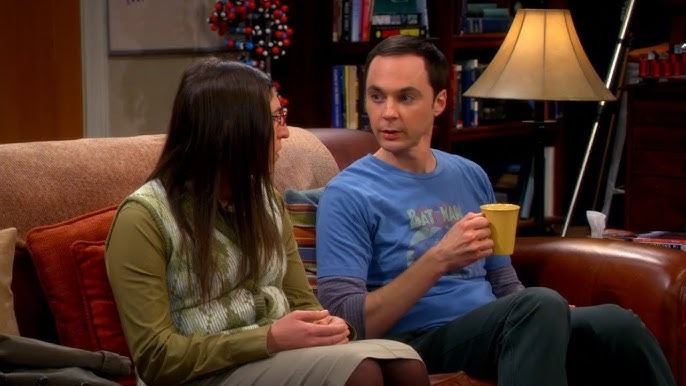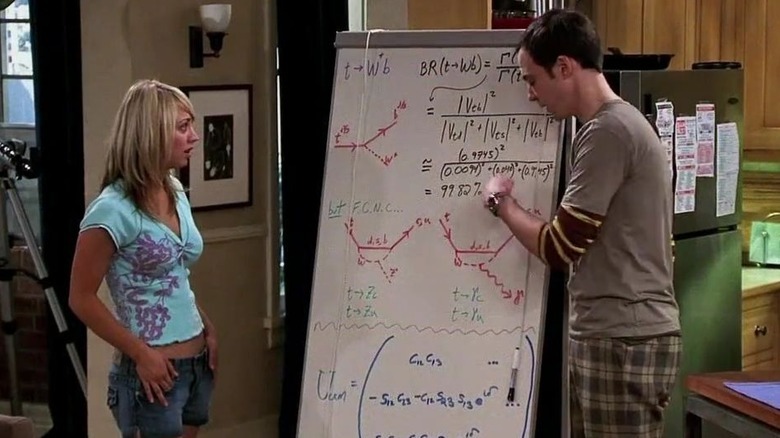
For over a decade, The Big Bang Theory was one of TV’s most popular sitcoms, captivating audiences with its blend of humor, nerd culture, and endearing characters. The show follows the lives of scientists Leonard, Sheldon, Howard, and Raj, along with their friend Penny, and later introduces key characters like Amy and Bernadette. While it attracted viewers of all ages, there are aspects of the show that are likely only picked up by adult fans. From subtle jokes and innuendos to deeper character dynamics, here are the things in The Big Bang Theory that adults might notice more than younger viewers.
1. Scientific Theories with Real-World Accuracy
One of the highlights of The Big Bang Theory is its frequent references to scientific concepts, making it a favorite among science enthusiasts. From explaining Schrödinger’s Cat to discussing the Doppler effect, the show incorporates actual scientific theories. What’s more, the writers enlisted Dr. David Saltzberg, a physics professor, as a consultant to ensure the science was accurate. He even helped with the mathematical equations seen on the characters’ whiteboards. Adult viewers familiar with science may appreciate this level of detail, while younger audiences might just enjoy the humor without understanding the deeper references.
2. Cameos by Icons of Nerd Culture
Throughout its 12-season run, The Big Bang Theory featured numerous guest stars, many of whom are beloved icons of pop culture. While younger fans might recognize celebrities like Elon Musk, older viewers likely have a deeper appreciation for appearances by legends like Stan Lee, Stephen Hawking, and LeVar Burton. One memorable episode features Sheldon spending the day with James Earl Jones, leading to hilarious antics. These cameos cater specifically to older fans who grew up admiring these figures, adding an extra layer of nostalgia.
3. Adult Humor and Sexual Innuendo
Though the show appears family-friendly on the surface, The Big Bang Theory often includes jokes that only adults will understand. Sheldon’s naivety about sexuality, for instance, leads to several moments of adult humor. In one episode, Sheldon finds a “battery-operated chew toy” in Penny’s apartment, clueless about its real purpose. The show also explores themes of romantic relationships and sexual tension, often with clever innuendo that younger viewers might miss.

4. Howard’s Questionable Behavior
In the early seasons, Howard is portrayed as a womanizer, often making inappropriate comments toward women. While his antics are played for laughs, adult viewers may find some of his behavior cringeworthy or problematic. His attempts to woo women often cross the line into creepiness, such as when he spies on Penny with a hidden camera. Although Howard matures after meeting Bernadette, his early behavior remains a point of contention, reflecting a broader conversation about sexism in media.
5. Raj’s Ambiguous Sexuality
Raj’s character often becomes the butt of jokes related to his ambiguous sexuality. The show includes several moments where Raj’s words and actions suggest he might have feelings for his male friends, especially Howard. In one scene, Raj talks about a dream where he and Howard live in neighboring mansions connected by a secret tunnel. The joke, meant to be humorous, hints at Raj’s repressed feelings. While this might go unnoticed by younger viewers, adults may see it as an example of the show’s outdated approach to LGBTQ+ humor.
6. Sheldon’s Unlabeled Neurodivergence
Sheldon Cooper’s behavior has been analyzed by fans and critics as fitting the traits of someone on the autism spectrum, though the show never explicitly labels him as such. His insistence on routines, his difficulty understanding social cues, and his obsession with his “spot” on the couch are all behaviors commonly associated with neurodivergence. Creator Chuck Lorre chose not to diagnose Sheldon, believing it would place too much responsibility on the show. However, adult viewers may recognize these traits as indicative of a broader conversation about autism representation in media.

7. The Hidden Truth Behind Leonard’s Glasses
Here’s a fun fact many viewers may not notice: Leonard’s glasses never have lenses in them. Actor Johnny Galecki made this choice early in the production because the reflection from the lenses created issues with the studio lighting. It’s a small detail that attentive adult viewers might catch, especially in scenes where the light would typically reflect off the glasses.
8. The Dark Implication of Bernadette and Howard’s Family History
In a surprising moment of dark humor, Bernadette casually mentions that her and Howard’s families were neighbors in Poland. While this might seem like an innocent fact, the implication becomes darker when Amy points out, “No, it’s not. I’ll explain it to you later.” Given the historical context of Poland during World War II, adult viewers may infer a possible connection to the Holocaust, making it one of the show’s most unexpected and grim jokes.
The Big Bang Theory remains a beloved sitcom with humor that appeals across age groups. However, there’s a layer of depth and complexity that only more mature audiences are likely to notice, making it a show worth revisiting even years after it ended.